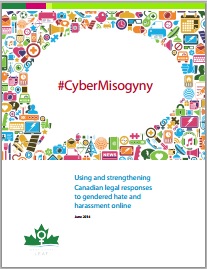New Law Reform Reports from West Coast LEAF
By Laura Track Legal Director, West Coast LEAF
West Coast LEAF has published two new law reform reports in the last couple of months, and we hope you’ll check them out!
 In June, we released #CyberMisogyny: Using and Strengthening Canadian Legal Responses to Gendered Hate and Harassment Online. Cyber misogyny is the term we use to describe sexualized bullying, harassment, and hate speech directed at women and girls online. While harassment and discrimination against women and girls are nothing new, the Internet has created new opportunities to perpetuate harassment and abuse widely and anonymously, and the law has been slow to respond.
In June, we released #CyberMisogyny: Using and Strengthening Canadian Legal Responses to Gendered Hate and Harassment Online. Cyber misogyny is the term we use to describe sexualized bullying, harassment, and hate speech directed at women and girls online. While harassment and discrimination against women and girls are nothing new, the Internet has created new opportunities to perpetuate harassment and abuse widely and anonymously, and the law has been slow to respond.
We analyzed five common manifestations of cyber misogyny:
- “revenge porn” (non-consensual sharing of intimate images, often by an ex-partner)
- “sexting” among youth
- child sexual exploitation
- cyberstalking
- gender-based hate speech online.
We provide an overview of the current legal responses available to victims of these forms of cyber misogyny under criminal, civil, and human rights law, and make 35 recommendations for how Canadian and BC law and policy could be strengthened to better protect the equality rights of women, girls, and other vulnerable communities online.
 Then in September, we released Able Mothers: The intersection of parenting, disability and the law. This report takes a critical look at the discriminatory misconceptions and stereotypes that can influence decisions affecting mothers with disabilities. It also makes recommendations for law and policy reforms to better protect the dignity, equality, and rights of disabled mothers and women seeking to become mothers.
Then in September, we released Able Mothers: The intersection of parenting, disability and the law. This report takes a critical look at the discriminatory misconceptions and stereotypes that can influence decisions affecting mothers with disabilities. It also makes recommendations for law and policy reforms to better protect the dignity, equality, and rights of disabled mothers and women seeking to become mothers.
Governments have a legal obligation to provide the supports necessary so that parents can provide a safe and nurturing environment for their children. However, our research shows that government is failing to meet this obligation, with devastating results for both children and their disabled mothers. Rather than removing children from their disabled parents and placing them in foster care, we believe that government should be providing the supports these parents need, in the best interests of their children.

